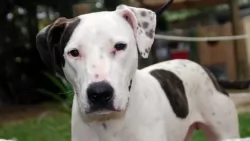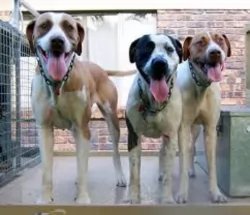 MyDogBreeds
MyDogBreeds Bull Arab is originated from Australia but Canadian Eskimo Dog is originated from Canada. Both Bull Arab and Canadian Eskimo Dog are having almost same height. Bull Arab may weigh 10 kg / 23 pounds more than Canadian Eskimo Dog. Both Bull Arab and Canadian Eskimo Dog has same life span. Both Bull Arab and Canadian Eskimo Dog has almost same litter size. Bull Arab requires Low maintenance. But Canadian Eskimo Dog requires Moderate maintenance
Bull Arab is originated from Australia but Canadian Eskimo Dog is originated from Canada. Both Bull Arab and Canadian Eskimo Dog are having almost same height. Bull Arab may weigh 10 kg / 23 pounds more than Canadian Eskimo Dog. Both Bull Arab and Canadian Eskimo Dog has same life span. Both Bull Arab and Canadian Eskimo Dog has almost same litter size. Bull Arab requires Low maintenance. But Canadian Eskimo Dog requires Moderate maintenance
 In the 1970’s feral pig hunters wanted a dog that could be aggressive in finding and capturing the pigs. The hunters crossed the German Shorthaired Pointer, the Bull Terrier and the Greyhound to develop the Bull Arab. It is believed that the hybrid is at least 50% Bull Terrier. It is also possible that there is some Doberman, Mastiff, Great Dane and/or Pointer in the hybrid as well.
In the 1970’s feral pig hunters wanted a dog that could be aggressive in finding and capturing the pigs. The hunters crossed the German Shorthaired Pointer, the Bull Terrier and the Greyhound to develop the Bull Arab. It is believed that the hybrid is at least 50% Bull Terrier. It is also possible that there is some Doberman, Mastiff, Great Dane and/or Pointer in the hybrid as well.
The job of the Bull Arab is to hunt out the feral pigs, grab one by the ear and hold it until the hunter arrives. They have a strong sense of smell and that is how they find the pigs.
Mike Hodgens, an Australian, developed the hybrid and added some Bloodhound as well to get that ability to smell out the pigs at great distances. They are also capable of catching buffalo and cattle. Some Australians use the breed in cattle or buffalo ranching. They are registered with the DRA or Dog Registry of America, Inc.
 The Canadian Eskimo Dog dates way back to more than 4,000 years ago. This Arctic breed of dog was developed to pull sleds, and wasn’t considered as a pet but as a working dog – an important means to an end – a tool for use.
The Canadian Eskimo Dog dates way back to more than 4,000 years ago. This Arctic breed of dog was developed to pull sleds, and wasn’t considered as a pet but as a working dog – an important means to an end – a tool for use.
By the 1960s the dog breed had declined to such an extent that they were removed from UKC and AKC registries. It is believed that the breed would have in all likelihood become extinct if it weren’t for the efforts of Brian Ladoon, William Carpenter and John McGrath who formed the Eskimo Dog Research Foundation in 1972.
After breeding for 30 years, the dog has the biggest genetic stock colony of Canadian Eskimo Dogs and in May 2000, Nunavut, a Canadian territory, adopted the dog as the animal symbol for this region.
 Mike Hodgens succeeded in developing a powerful, well built dog. The Bull Arab has a powerful head and muzzle. He has moderate length drop ears and bright eyes that match the color of his coat. His chest is neither shallow nor deep and his back is straight and strong. Their tails are tapered and pointed yet the base is thick. They are a double-coated dog. They can be white with black, tan or liver, flecked or bicolor.
Mike Hodgens succeeded in developing a powerful, well built dog. The Bull Arab has a powerful head and muzzle. He has moderate length drop ears and bright eyes that match the color of his coat. His chest is neither shallow nor deep and his back is straight and strong. Their tails are tapered and pointed yet the base is thick. They are a double-coated dog. They can be white with black, tan or liver, flecked or bicolor.
 The Canadian Eskimo Dog is a well-built, medium- to large sized dog looking much like a husky. The male Eskimo dog is somewhat bigger than the female, standing 58 – 70cm at the shoulder and weighing 30 - 40kg.
The Canadian Eskimo Dog is a well-built, medium- to large sized dog looking much like a husky. The male Eskimo dog is somewhat bigger than the female, standing 58 – 70cm at the shoulder and weighing 30 - 40kg.
The male often has some thick fur around the neck, giving him the appearance of looking larger than he actually is. He is slightly larger than the female. Other people say he has a similar appearance to a wolf.
He has a thick double coat which can be white, gray, fawn or even black and white. He has short, erect ears, dark brown eyes and a bushy, feathered tail which curls over the back. Sometimes you find blue eyes with the Canadian Eskimo Dog, and its only when you want to show him, that this isn’t acceptable.
The Canadian Eskimo Dog's temperament is hard working, tough, brave, alert and intelligent. When he is trained and socialized, which will be important for this breed, he becomes gentle and loving, forming a strong bond with his owner. He’ll also get along well with children in the home as well as other pets.
 The Bull Arab is intelligent, calm and loyal. Like Pit Bulls in the U.S., the Bull Arab has a reputation for aggression against both people and animals. There is no data to support these claims. They have been used as therapy dogs and companion animals very successfully. They are great with kids and very affectionate. The breed is cited as being used for companion and therapy animals
The Bull Arab is intelligent, calm and loyal. Like Pit Bulls in the U.S., the Bull Arab has a reputation for aggression against both people and animals. There is no data to support these claims. They have been used as therapy dogs and companion animals very successfully. They are great with kids and very affectionate. The breed is cited as being used for companion and therapy animals
 The Canadian Eskimo Dog is a dog which is responsive to training. With training and socialization, as a highly intelligent, strong-will dog he will need to be supervised by a firm, authoritative figure.
The Canadian Eskimo Dog is a dog which is responsive to training. With training and socialization, as a highly intelligent, strong-will dog he will need to be supervised by a firm, authoritative figure.
He makes such an awesome pet when properly trained, and if you’re a responsible dog owner who knows how to care for- and exercise your pet appropriately, you’ll be rewarded by having a strong, loving companion at your side.
 This is an extremely healthy hybrid with no inherited issues, but they can possible have the same health issues as any of the parent breeds. This can include accidents while hunting, hip and elbow dysplasia and ear infections.
This is an extremely healthy hybrid with no inherited issues, but they can possible have the same health issues as any of the parent breeds. This can include accidents while hunting, hip and elbow dysplasia and ear infections.
 The Canadian Eskimo Dog is a generally healthy breed who has a life expectancy of between 10 and 15 years when he is lovingly cared for and provided with a top quality diet. Ensure that he has a top quality diet with plenty of raw meat geared towards his age and energy levels.
The Canadian Eskimo Dog is a generally healthy breed who has a life expectancy of between 10 and 15 years when he is lovingly cared for and provided with a top quality diet. Ensure that he has a top quality diet with plenty of raw meat geared towards his age and energy levels.
The Canadian Eskimo Dog suffers from common health issues that most dogs are at risk for, and typically this will include hip dysplasia and eye disease. If your dog develops a disease such as hip dysplasia, speak to your vet immediately.
 This is a working dog so he needs to eat the right kind of quality dog food. In order to avoid bloat do not feed large meals but rather feed one to two cups of food two to three times a day.
This is a working dog so he needs to eat the right kind of quality dog food. In order to avoid bloat do not feed large meals but rather feed one to two cups of food two to three times a day.
Hunting Accidents – this is the biggest reasons for health problems with the Bull Arab.
These are working dogs that are inactive when not working. They need a lot of exercise if they are not used for hunting. Agility, Tracking and hunting games, and field trials.
 The Canadian Eskimo Dog has always been a working dog, used to being driven hard to perform, and to this day he likes to work hard and have his day filled with activities.
The Canadian Eskimo Dog has always been a working dog, used to being driven hard to perform, and to this day he likes to work hard and have his day filled with activities.
His exercise requirements are high and this is one breed that you’re going to have to exercise regularly – long walks, running on a leash as you cycle, ball games, swimming, hiking. It is why the dog is best suited for life in the country as opposed to small properties in the city. If exercise seems like a lot of hard work for you, don’t buy such a breed as it will be cruel and irresponsible to leave him day after day in your back yard. He becomes bored, frustrated, unhappy and destructive.
The dog is an average shedder and his coat is short and dense. There’s not a whole lot of maintenance to worry about with this good-looking dog and he will basically require having a good brush twice a week.